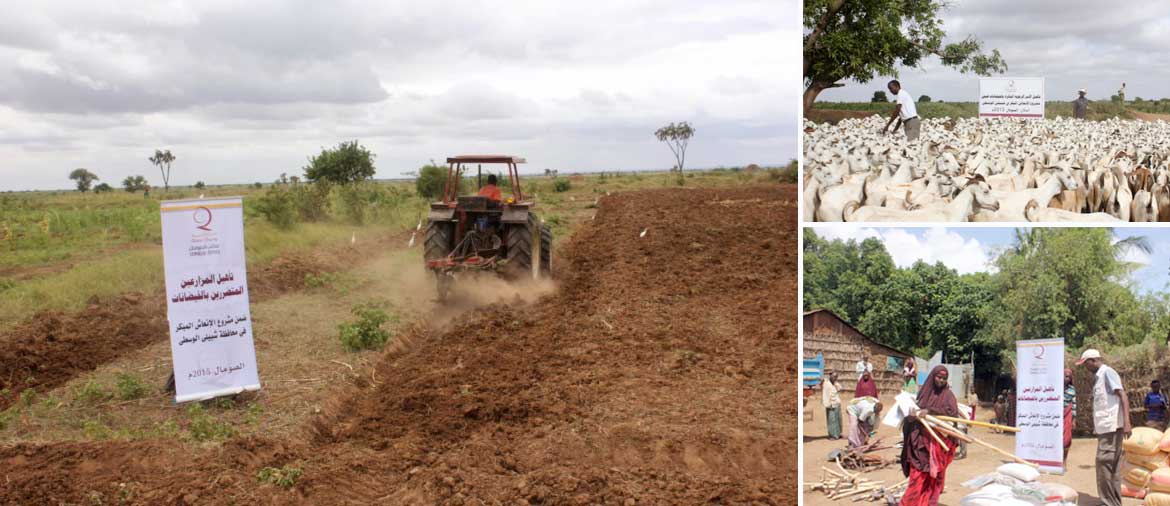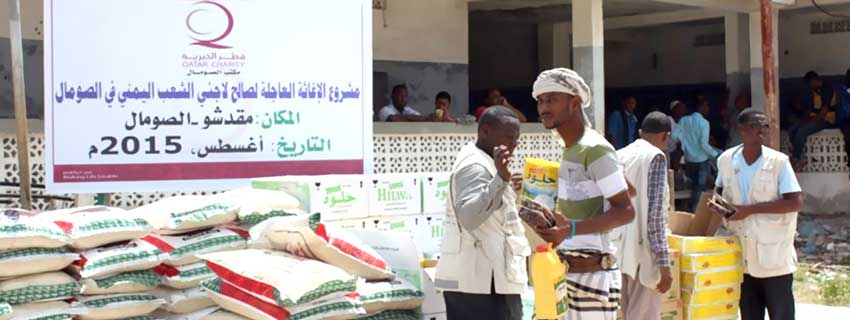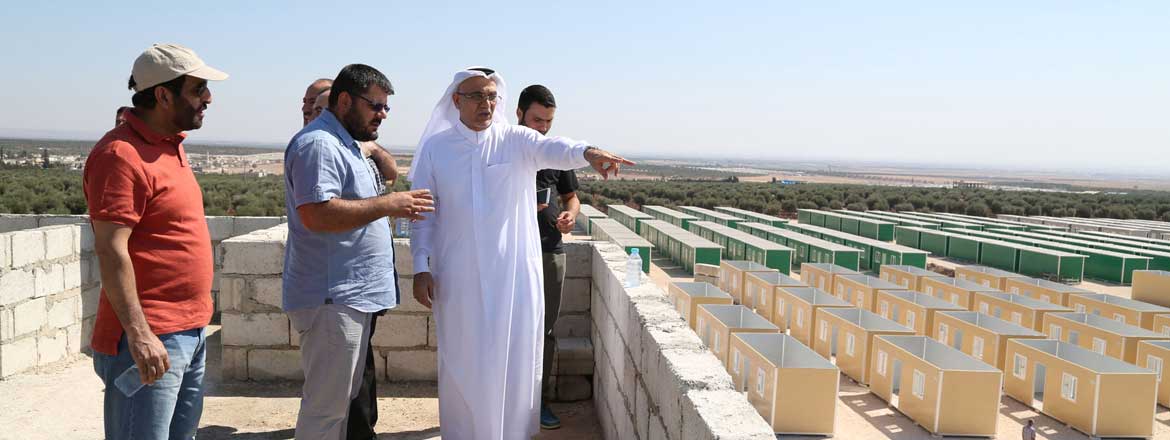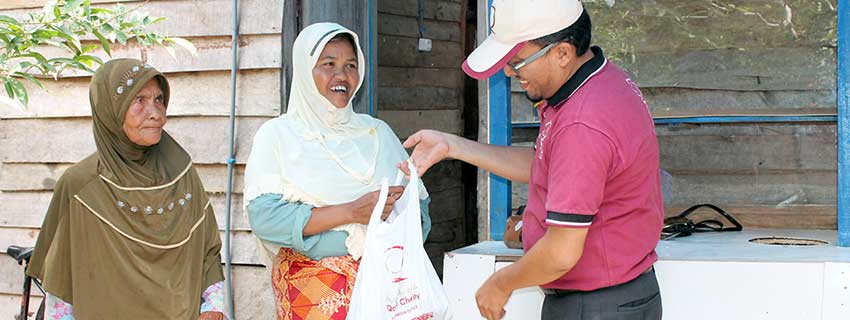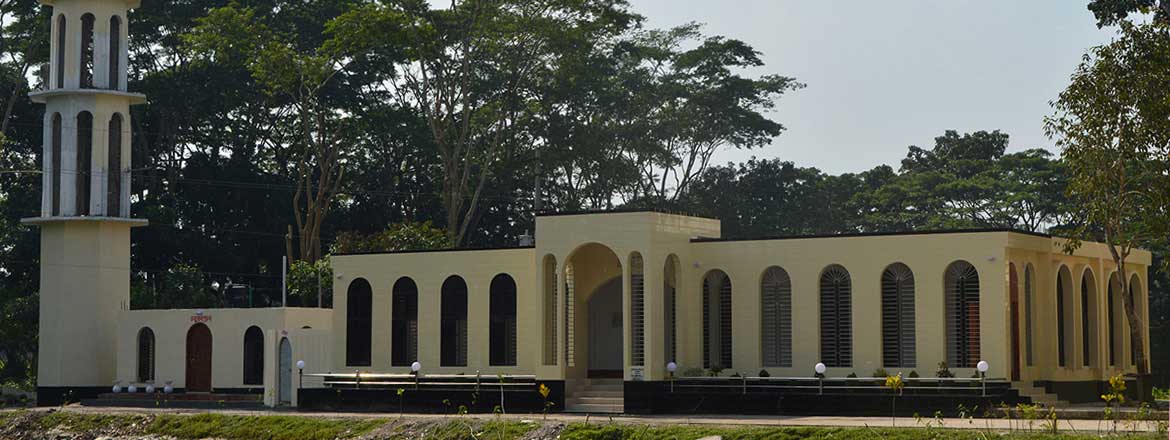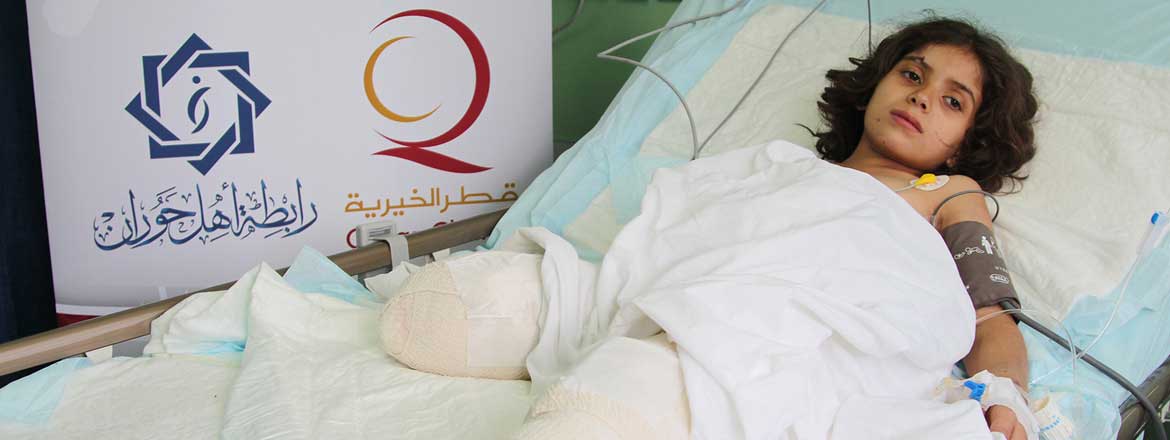QC Supports 250 Farming Families in Somalia

2016-04-25T02:29:43+01:00

Through its office in Somalia, QC implemented a project to support young farmers who were affected by the floods which hit the country the past years. This project is considered part of the Early Recovery program designed to help the floods-affected in Middle Shebelle.
The project is mainly about supporting 250 poor farming families which live by the Shebelle bank in Jawhar Province. The benefiting families would receive manual plowing tools, seeds and pesticides. 250 hectares of lands would be reformed; 1 hectare for each family.
Empowering Farming Families
In order to help the farming families permanently benefit from the running river, QC provided 10 engines for irrigation. These engines were distributed according to the agricultural cooperatives which represented the young farmers. In addition, 10 km of irrigation canals were rehabilitated to help the beneficiaries farm throughout the whole year. That positively helped the farmers increase their crops, thus increase their income.
Early Recovery
This project is implemented to help the floods-affected in Middle Shebelle. It aims at offering more humanitarian services, where such services are not sufficient. It also aims at offering the affected the help they need because of the harsh life they live. The project seeks to help the agricultural communities in rehabilitating and resuming the farming business. The project offers them seeds, pesticides, and manual plowing tools necessary for local production.
It also helps them through reforming the farming lands, rehabilitating the irrigation canals, re-operating the health and educational systems, raising the standards of the affected families. It will serve the health and educational systems through rehabilitating the educational, health and water facilities, schools, clinics and wells. As for raising their living standards, the project offers small income-generating projects.
Mr. Mohammed Hussein, QC's Office Director in Somalia, expressed his deep thanks and gratitude for the philanthropists of Qatar for the efforts they exerted. "This reflects the goodness of the giving Qatari community. Helping our brothers and sisters in Somalia in the fields of shelter, food, medications and others springs from the Qataris' understanding of their moral and religious duty towards the needy people around the world," he said.
Continuous Aids
Through its office in Somalia, QC has recently started implementing its urgent relief project for the people who were affected by the drought which hit Somalia Land, to the North West of Somalia. The project targets around 30,000 affected family members. The food supplies, clean water, and medications will be distributed to them.
The project also includes delivering 3,000 food supplies to the drought-affected families for a whole month. In addition, 7,875 affected people will receive clean water through water tanks. 2,000 people will receive health services through mobile clinics which aim at carrying out medical tests and dispensing medications. Furthermore, some doctors and nurses will be contracted with in order for them to raise people's awareness about health issues.
Rehabilitating the Water Wells
In Middle Shebelle in Somalia, QC has recently finished rehabilitating 7 Artesian wells as part of its early recovery projects which targeted the flood-affected people. The beneficiaries used to suffer from shortages in drinking water. The project is expected to serve more than 24,000 people and tens of thousands of cattle on a daily basis.
The project aims at resuming the services of public facilities such as those related to education, health and water. In addition, it aims at meeting the people's need for drinking water. The floods had destroyed the Artesian wells and people were forced to leave their houses and use tools that took hours so as to get a few liters of clean drinking war.
You can donate to support such projects through the link: Click here
Related News
QC Implements Tens of Qualitat
- Hundreds of goats were distributed to the people to help them start over.
- Tens of hectares were restored for 250 families whose lands had been flooded.
As part of its early relief program to the victims of floods in the Middle Shebelle governorate in Somalia, QC implemented qualitative income-generating projects from which 400 families of the same governorate benefited.
Rehabilitation:
The projects included rehabilitation of the affected families and improvement of their life quality, in addition to supporting agriculture and shepherding. The program also included funding income-generating projects. For example, 750 goats were distributed to 150 families. Each family received 5 goats. This project was to enable them to get their ordinary lives back after the floods. The project also aimed at supporting shepherding and providing these families with a source of income that matched their previous professions.
QC has also restored agricultural lands in a total area of 250 hectares for 250 families who had worked in farming before the floods damaged their lands.
QC seeks to rehabilitate the agricultural and shepherding societies and start agricultural and shepherding businesses by supplying the workers with seeds and pesticides as well as manual cultivation instruments needed for local production. QC also helps them in their farmland restoration, and irrigation canals’ reformation. The program also supplied them with some cattle.
Terrible Immigration
The regions adjacent to the two rivers of Shebelle and Juba witnessed heavy rains in last October and November which led to the flooding of the rivers and caused a disastrous immigration of the inhabitants of the rivers’ banks. Middle Shebelle was mostly affected as most irrigation canals and flood control systems were damaged along the Shebelle River by these floods. Reports show that about 10,000 of the local inhabitants left their flooded cities, villages, and farms.
The objective QC had of the early relief project was to reach the local affected community in the governorate as it helped rehabilitate them in their crafts and professions. QC’s goal was to enable them to increase their daily income and enhance their life quality through a number of strategic projects including shops, production machinery, animals, and farmland restoration. This should facilitate their future confrontation to yearly floods. This project also seeks to restore artesian aquifers, reform schools and damaged clinics to help 93,000 people living in the region.
Tens of Thousands Beneficiaries
It is worth mentioning that QC has recently implemented various projects in Somalia including education, health, building mosques, and funding income-generating projects. Tens of thousands of Somalis around Somalia benefited from these projects. Of its construction projects in Puntland, QC inaugurated the reformation of 2 health centers and 2 preliminary schools at a cost of about 292,000 QR.
QC inaugurated the opening of 9 mosques, and 8 centers for memorization of Qur’an in 3 provinces in the north of Somalia: 3 mosques in the coastal province, 3 others in Burco, 1 in Awdal, and 2 in Hiran and Banaadir. It also built 8 centers for Qur’an memorization in Hiran, Banaadir, and Hargeisa. Thousands of Somalis shall benefit from these mosques and centers.
QC office in Somalia has also organized events of distributing sewing machines to 65 productive families in Mogadishu and Hargeisa city in Somaliland in cooperation with Jedoon Association for Woman and Child Development in Hargeisa and HINNA association in Mogadishu.
You can donate to support such projects through the link: Click here
QC Implements Relief Projects
- The aids are sufficient for the refugees and returnees for a month
- Members of the Somali Parliament and Representatives of the Yemeni community contributed in the distribution
Through its office in Somalia and as part of its relief campaign “Yemen, We are With You”, QC implemented an urgent relief project which targeted 600 families of the Yemeni refugees in Somalia and some of the Somali returnees from Yemen who are living in Mogadishu, Hargeisa, and Bosaso.
The food baskets, distributed to the beneficiaries, were sufficient for a whole month. Each family received 25 kg of rice, 25 kg of flour, 15 kg of sugar, 3 liters of cooking oil, 2.5 kg of powder milk, and 2 kg of dates.
Prominent Figures
Many prominent figures took part in the distribution of the aids to the people, including some members of the Somali parliament, and the representatives of the Yemeni community in Somalia. They all commended QC’s role in helping the Yemeni and Somali peoples.
This is one of so many other projects in which QC continues to fulfill its role in aiding and helping others. In addition, QC always makes sure that its beneficiaries are the neediest. The Yemeni people are suffering from a dire crisis which forced the families to emigrate and ask for asylum. This, of course, left the families without any living necessities.
Although Somalia is suffering from hard conditions and security issues, it became one of the countries which received the Yemeni refugees. Therefore, it is now the responsibility of those who work in charity and humanitarian fields to strengthen their efforts so that Somalia does not suffer from a critical condition, too.
130,000 Beneficiaries
130,000 beneficiaries benefited from QC’s continuous campaign ‘Yemen, We Are with You’ since the recent Yemen crisis started and until the end of last May (2015).
The food aid included 17,300 food baskets, 80 tons of flour, and 180 tons of different types of food which were distributed to the different governorates. Furthermore, 3 kitchens were prepared and equipped with foodstuff to provide daily fresh meals for 1,000 persons. Regarding healthcare, the hospitals of Aden, Ma’rib, and Taiz were supplied with some equipment, 100 first-aid bags, and a large amount of medications, and medical disposables.
In addition, 8 water tanks were distributed in Aden with the capacity of 1,000 liters. QC also distributed hundreds of mattresses and blankets to the displaced families there. Another project was funded to clean Aden Municipality in cooperation with its workers.
Call for Help
It is worth mentioning that when the Yemeni crisis started, QC appealed for help to provide 1,260,000 conflict-affected people with food, and medications.
After its appeal and as a first step, QC launched its campaign ‘Yemen, We Are with You’ to collect 36,500,000 QR (10,000,000 USD) to urgently deliver these humanitarian aids to the most affected categories.
QC also supervised the distribution of aids which Qatar sent to the people of Yemen. The aids were delivered through an air bridge from Doha to Djibouti–Ambouli International Airport following the instructions of his highness Sheikh Tamim bin Hamad Al Thani, God bless him. The aids were delivered over two days; there were 4 airplanes which carried 240 tons of different materials.
The aids were received by a delegation of QC which included Mr. Ibrahim Ali Abdullah, QC's Relief Department Director, and Mohammed Wa'i, QC's Office Director in Yemen.
QC’s field team was able to aid many conflict-affected families since the crisis first started in Aden and other Yemeni cities. They provided the families with food, drugs, and medical disposables. They sent the medical supplies to the hospitals so that they would treat the injured. The team also provided the families with food baskets and other basic and necessary items.
You can donate to support such projects through the link: Click here
QC Delegation Follows up with
- Around 70% of Al Rayyan City project was completed; the displaced Syrians living in tents will move there before winter
- Al Rayyan city comprises 10 villages; each village has 100 housing units. In addition, it has service facilities which include 30 classrooms, a mosque, a clinic, and playgrounds for children.
- The city is environmentally friendly; its lighting will depend entirely on solar energy.
- Zienal: “Our visit aims at following up with this project’s progress and making sure its implementation will be on time since QC wants to provide a shelter for thousands of displaced Syrians before winter.”
- Al Yaf’ie: “The builders of the city are 100% Syrians; and once it’s entirely constructed, its people will be its governors.”
It is expected that by the coming November, the biggest residential city, which QC implemented near the Syria-Turkey borders for the displaced Syrians, will have been built. The city can accommodate around 7,000 people, and was implemented at a cost of more than 40,000,000 QR.
In order to closely follow up with the work progress in the city, to review what was completed and what is left, a delegation from QC paid Al Rayyan city a visit. The delegation included Mr. Mohammed Abdullah Al Yaf’ie, Support Affairs CEO; and Mr. Ibrahim Zainal, QC’s Deputy Executive Director of International Development; accompanied with Urooj Hussain, Deputy Director of the Turkish International Human Relief and Humanitarian (IHH) – the party which provided the land for the project and supervised its implementation.
During the tour in the model city which QC called ‘Al Rayyan City’ for displaced Syrians, the delegation visited the housing units which were already completed. They also visited other housing units and service facilities which are under construction, including the mosque. The delegation reviewed the plan set for the completion of this huge project. They were pleased to see the completion of 70% of the project. In the meeting, the delegation emphasized the importance of working steadily so as to entirely implement the project in the coming November to secure shelters for thousands of displaced Syrians before winter.
A Tour in Al Salama Camp
At the same time of visiting Al Rayyan city, QC’s delegation visited Al Salama refugee camp for the displaced Syrians. They checked upon the Syrians’ severe circumstances and sufferings. It is also expected that some of these Syrians will be moved to Al Rayyan city once it is entirely constructed in order to provide them with a dignifying shelter.
In a press release, Mr. Zeinal said, “QC paid this field visit because it always makes sure to follow up with the work progress of its distinguished projects in general and the completion of this project in particular. All of which is to ensure a shelter for thousands of displaced Syrians before winter. To the conflict-affected Syrians, shelters top their list of priorities; which is why we hope a lot of displaced Syrian families, who are still living in tents near the Turkey-Syria borders, benefit from this project.”
In addition, Mr. Mohammed Abdullah Al Yaf’ie commended the distinguishing features of this project; the most important one is the fact that the laborers working on the project are 100% Syrians. Furthermore, this project is environmentally friendly; its lighting will depend entirely on solar energy. Finally, once the project is entirely implemented, the people of the city will be its governors.
The City’s Facilities
This model city consists of 10 villages; each village consists of 100 caravans. The beneficiary families will get a shelter with an area of around 17.5 m2, a width of 2.5 m, a length of 7 m, and a height of 2.5 m. Plus, it comprises two rooms. It can accommodate a family of 6 or 7 members. The place will be equipped with the basic needs such as mattresses, blankets, pillows, carpets, space heaters, a refrigerator, water tanks, closets, and cookware.
Al Rayyan city has several service facilities such as a mosque, 30 classrooms, several clinics, administrative offices, and playgrounds for children. A wall will be built around the city to secure its safety. The lighting will depend on solar energy, which makes the project ‘Al Rayyan City’ environmentally friendly.
This project is the outcome of a cooperation agreement between QC and IHH, which was signed in Istanbul few months earlier. Mr. Youssef bin Ahmed Al Kuwairi, QC’s CEO, and Bulent Yildirim, IHH President, signed the agreement in Istanbul, Turkey. The agreement states that QC will donate 33,000,000 QR, while IHH will donate 7,000,000 QR, and will supervise the implementation of this project.
According to the FTS of the UN’s office for the coordination of humanitarian affairs, QC was rewarded first rank universally for its aid for the Syrian people in the last three years.
The total cost of QC’s implemented projects for the conflict-affected Syrians until last March reached 240,000,000 QR from which 4,500,000 QR people benefited. 60% of these projects were implemented inside Syria. They included food, shelter, health, sponsorship and others. The rest of the projects were implemented for the Syrian refugees in the neighboring countries.
You can donate to support such projects through the link: Click here
1,000,000 People Benefit from
- 43,200 conflict-affected in Syria, 4,200 orphans’ families in Gaza, 120,000 people from different countries benefited from ‘Your Sacrifice, their Eid’ campaign
- El Kuwairi: “We thank the Qatari people for donating to our sacrifices project which made the needy of 52 countries the world over happy
Around 1,000,000 people benefited from the sacrifices campaign for the year 1436 AH which QC implemented and called ‘Your Sacrifices, their Eid’ at a cost of around 14,000,000 QR.
Mr. Youssef Bin Ahmed El Kuwairi, QC’s CEO, expressed the relief he felt because the sacrifices project was successful. QC implemented this campaign with the help of its partners in 52 countries from around the world, including Qatar. It was able to make so many needy and low-income families, who could not provide their children with meat, happy.
The affected who suffered from exceptional circumstances were prioritized such as the Syrians inside Syria, the Syrian refugees in the neighboring countries, the Gaza Strip, Yemen, Somalia, etc.
El Kuwairi said, “I am mostly thankful to those who donated for this project in Qatar, and I pray Allah that He accept their good work and reward them. Most certainly, their donations were the reason behind making the needy happy and achieving social teamwork in Qatar.”
QC had already distributed more than 28,300 sacrifices during the season, which meant 500 tons of meat in 52 countries. More than 43,200 families inside Syria benefited from the project. It was implemented in Damascus and its countryside, Idlib and its countryside, Al Rastan, Al Houla and Talbiseh in the countryside of Aleppo, in the countrysides of Hama, of Lattakia, of Daraa, and Quneitra. In addition, 4,200 orphans’ families from the Gaza Strip and 120,000 Somalis benefited from the project.
Other countries in which the project was implemented:
Palestine, the Palestinian camps abroad, Iraq, Jordan, Qatar, Tunisia, Morocco, Lebanon, Sudan, Rwanda, Uganda, Malawi, Burundi, Kenya, Ivory Coast, Djibouti, Tanzania, Mali, Togo, Nepal, India, Chad, Central Africa, Angola, Guinea Bissau, Mauritania, Yemen, Bangladesh, Benin , The Gambia, Namibia, Lesotho, Sri Lanka, Niger, Nigeria, Sierra Leone, Liberia, Congo, South Africa, Ethiopia, Burkina Faso, Senegal, Pakistan, Kyrgyzstan , Indonesia, Kosovo, Comoros Islands, Albania, the Philippines, Ghana, Bosnia, Ethiopia, and Georgia.
QC inaugurated a special campaign for pilgrimage and Eid Al Adha for this year (1436 AH). It included distributing the sacrifices inside and outside Qatar, giving people the chance to perform substitute Hajj, and distributing Eid clothing. Tens of thousands of people will benefit from this project.
The project was also implemented inside Qatar on the third and fourth days of Eid Al Adha. 2,500 sacrifices were distributed from which 12,000 people benefited, including 668 sponsored families with limited income.
Some of the Qatari volunteers helped in the distribution. In addition, QC, for the first time, offered delivery service using refrigerated cars. The sacrifices were given to the beneficiaries at their homes in Khor, Al-Shahaniya, Industrial Area (Sanaiya), and other areas inside Qatar.
This project also targeted the orphans’ and the low-income families, the indebted, the laborers, the divorced, Ramila Hospital’s inpatients, the laborers, courts, the bank, the mail, Al Qahira School, Al Cilia territory, and Abu Hamur territory and the Indian, Egyptian, Yemeni and Philippine communities.
You can donate to support such projects through the link: Click here
QC Builds 30 Mosques and 3 Qur
The plan of QC's office in Bangladesh for the year 2015 includes building 449 mosques and 22 centers for the memorization of the Quran at a cost of 25,928,395 QR from which 200,000 people are expected to benefit. Most of the work has been completed.
By the end of last October, QC had finished building 30 mosques and 3 centers for the memorization of the Quran. They were fully equipped and furnished. They had mattresses, carpets, speakers, fans, shelves for the Holy Quran and other religious books. It is expected that thousands of people will be benefiting from the project, especially those living in the villages and the countryside.
The mosques and centers are built according to excellent standards. They offer a comfortable atmosphere for students and the performers of prayer. They will be able to pray with complete serenity and devotion. They encourage learning and memorizing the Quran, and learning other Sharia sciences. The inhabitants will not have to fear the changing weather; neither the cold nor the heat.
In comparison to the mosques and centers the people of the countryside build, QC's mosques and centers are so much better. Because of their bad financial status, the inhabitants use bamboo sticks, wood, clay, and Zink for building. Their financial resources are very little.
Built last October, these mosques and centers are considered to be part of the plan QC had set for the first 10 months of 2015 for Bangladesh. The plan included building 449 mosques and 22 centers for the memorization of the Quran at a cost of 25,928,395 QR from which 200,000 people are expected to benefit.
Dr. Mohammed Amin Hafith, QC's Office Director in Bangladesh, said that many of the projects were already entirely implemented, while the rest will be so during the coming two months of this year and the beginning of the next one.
"I thank the philanthropists and good doers from Qatar for their generous donations which contributed to the implementation of these projects. QC's projects have left a great impact on the lives of the people of Bangladesh. The projects seek to compensate for the shortages the people suffer from specially in the countryside," said he.
Furthermore, QC has recently implemented a number of projects in Bangladesh which provided public services, health, education, water, mosques and memorization centers. It is expected that 172,000 people will benefit from these projects which were implemented at a cost of around 4,600,000 QR. The supervisors anticipate that by the end of 2015, the work progress will have continued. The services these projects offer are going to be available. The people will be able to start memorizing the Quran, they will have clean drinking water and water for home use, and they will benefit from social care services. Plus, the orphans will have a place to live in, they will have food, will be educated, dressed, treated and trained.
It is worth mentioning that QC has recently built 72 mosques in different places in Bangladesh at a cost of around 4,000,000 QR from which 10,000 people benefited. Plus, next to each mosque, QC dug an Artesian well.
In addition, QC has organized a wedding ceremony for a group of couples in the hall of Al Banat (Girls) Center. 22 orphans benefited from this project; and it was out of their desire to 'complete the other half of their religion' (as marriage is considered to be so in Islam). After the ceremony was over, the beneficiaries received supplies for their houses.
QC's Office in Bangladesh
QC started its charity work in Bangladesh when it officially opened its office there in 1995. The quality and number of projects increased rapidly. They included developmental activities and fields such as education, health, water, sanitation, relief, skills improvement, social care, and others.
You can donate to support such projects through the link: Click here
QC Implements the Third Projec
- The treated injuries included neurological and pulmonary diseases, bone fracture, burns and blood vessel injuries.
- The project helped save many Syrians
QC continues to implement its relief projects for the Syrian people in the field of health. It has implemented its third project for the severely injured from which 100 people benefited and were transferred to Jordan.
Implemented in cooperation with Association of Ahl Horan, the project meets the Syrians deep need for health rescue. Many injured and with critical health problems needed treatment. Therefore, QC offered them first aid, transferred them to nearby Jordanian hospitals and finally transferred them to specialized hospitals, depending on the severity of the injury.
Intensive Care
The neurological injuries which were treated included head bruises, shrapnel and gun shots in the brain, and vertebral fracture of the neck which results in either complete or partial paralysis. As for the pulmonary injuries, they included: bruises and pulmonary contusion, pleural effusion, and heart injuries. In addition, some other injuries which were treated included injuries in the abdominal organs and blood vessel, burns of all levels, eye injuries and loss of vision which resulted from shrapnel hits.
Engineer Rashid bin Fatis Al Mari, QC’s Director of Relief Department, said, “Jordan receives tens of Syrian injured coming from Hauran, Damascus countryside, and Kenitra every day. These injured usually suffer from severe injuries which require intensive care. Therefore, QC decided to allocate funds of around 100,000 USD to treat the severe injuries. These funds are automatically renewed after the end of each treatment stage to more than 100 Syrian injured at least.”
Taking Care of the Injured
QC, as Eng Al Mari mentioned, continues to nurse the injured until their full recovery. In addition, QC will do everything necessary to make sure the injured will not suffer from deformities and malformations.
QC pays extra attention to the relief of the Syrian people, whether the displaced in the country or the refugees. Since April 2011 to last September (2015), 6,083,517 crisis-affected have benefited from the projects which were implemented at a total cost of 322,000,000 QR.
QC’s projects implemented for the Syrian people since the crisis first began included the following fields: shelter projects at a cost of 120,214,000 QR, food at a cost of 102, 561,000QR, health at a cost of 68,214,000 QR and education at a cost of 30,755,000 QR.
As for the health field, QC’s relief projects mainly focus on establishing and operating hospitals, creating funds for the treatment of the injured and patients, and providing medical disposables and ambulances. The most important hospital for establishment and operation is Al Amal Hospital for the Syrian Refugees in south Turkey.
Other projects
More than 100 people suffering from either partial or complete paralysis, or whose legs were amputated because of the ongoing crisis in Syria benefited from QC’s electric wheelchairs project. It was implemented to help them meet their needs and to alleviate their sufferings. The wheelchairs were distributed to 36 people with complete paralysis, 44 people with partial paralysis and 20 people whose legs were amputated.
QC has also supplied a number of field hospitals and medical charity points with 8 fully equipped ambulances.
Furthermore, QC has signed a universal strategic partnership with International Medical Corps last year. The agreement allows the two institutions to increase their chances of reaching the neediest places in the world. Mainly, they will be able to help the crisis affected in Syria, to offer health care for the children especially that there is a shortage in the usual medical services.
Last October, QC concluded its conference ‘The Syrian Humanitarian Crisis’. More than 100 participants representing 50 different institutions, governmental and nongovernmental organizations attended. The outcomes of the conference were implementing projects at a cost of more than 144,000,000QR and making recommendations for the benefit of the Syrian people.
You can donate to support such projects through the link:Click here
